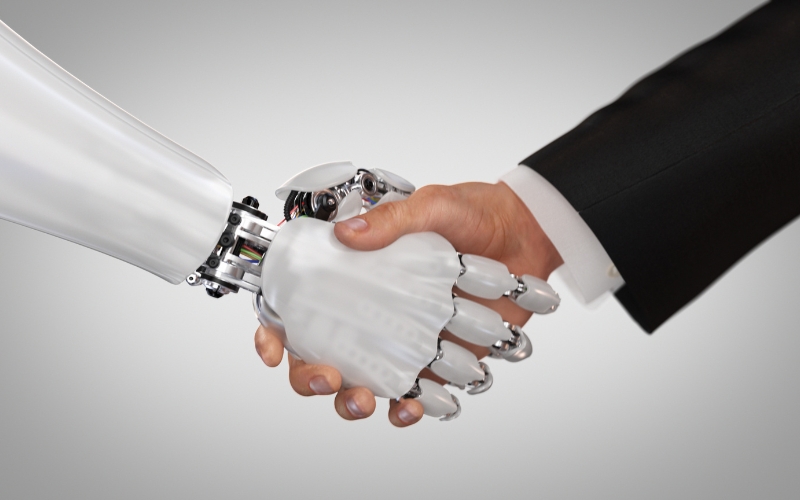Artificial Intelligence (AI) is revolutionizing the way executive search firms identify and hire top leadership talent. From advanced candidate sourcing to predictive analytics, AI-driven tools are streamlining recruitment processes and improving hiring accuracy. As competition for executive roles intensifies, Executive Search Firms Use AI for Hiring to enhance efficiency, reduce bias, and make data-driven decisions. By integrating AI into their hiring strategies, these firms are redefining how leadership roles are filled in today’s fast-paced business landscape.
The Evolution of AI in Executive Search

Artificial Intelligence (AI) has significantly reshaped the hiring landscape, and Executive Search Firms Use AI for Hiring to streamline the recruitment process. Traditionally, executive search relied heavily on manual research, networking, and intuition. However, with AI-driven tools, firms can now analyze vast amounts of data to identify top-tier candidates more efficiently.
One of the primary reasons Executive Search Firms Use AI for Hiring is to enhance candidate sourcing. AI-powered algorithms scan resumes, LinkedIn profiles, and other professional databases to shortlist potential candidates based on specific qualifications and experience. This automation reduces the time recruiters spend on initial screening, allowing them to focus on personalized candidate engagement.
Moreover, AI has transformed the way firms assess candidates. Machine learning models analyze historical hiring data to predict a candidate’s suitability for an executive role. Natural language processing (NLP) tools can evaluate communication styles, leadership traits, and cultural fit, helping firms make more data-driven hiring decisions.
Another crucial factor driving AI adoption in executive search is its ability to reduce unconscious bias. Traditional hiring methods often introduce human biases that can affect diversity in leadership positions. AI-driven platforms provide objective assessments, ensuring that executive roles are filled based on merit rather than subjective opinions.
As industries continue to evolve, the demand for AI in recruitment will only grow. Companies looking for top leadership talent expect faster, more precise hiring solutions, making AI an indispensable asset. This is why Executive Search Firms Use AI for Hiring to stay competitive in the modern recruitment landscape.
“AI-driven hiring is changing the game, but data-driven strategies also play a key role. Discover how analytics improve placements in [How Data-Driven Hiring Improves Executive Placements].”
AI-Powered Candidate Sourcing and Screening
AI has revolutionized the way Executive Search Firms Use AI for Hiring, particularly in candidate sourcing and screening. Traditionally, recruiters relied on manual efforts, professional networks, and referrals to identify top executive talent. However, AI-driven tools now allow firms to scan thousands of resumes, LinkedIn profiles, and job boards in a fraction of the time, ensuring a more comprehensive and efficient search process.
Machine learning algorithms play a crucial role in evaluating potential candidates. These systems analyze past hiring patterns and compare them with current job requirements to shortlist individuals who align with the role’s expectations. By leveraging predictive analytics, firms can assess a candidate’s likelihood of success in a leadership position based on historical data and behavioral trends. This is a major reason why Executive Search Firms Use AI for Hiring to improve decision-making and enhance efficiency.
AI-driven screening tools also help recruiters evaluate soft skills and cultural fit. Natural language processing (NLP) technologies analyze a candidate’s communication style, leadership approach, and problem-solving abilities through their digital footprint, including emails, reports, and interviews. This enables recruiters to gain deeper insights beyond what a traditional resume or cover letter can provide.
Another advantage of AI-powered screening is its ability to minimize human bias in the hiring process. Traditional recruitment methods often introduce unconscious biases, leading to less diverse leadership teams. AI ensures that candidates are evaluated solely on their skills, experience, and potential, rather than subjective factors. Given the growing demand for data-driven hiring strategies, it’s no surprise that Executive Search Firms Use AI for Hiring to optimize their recruitment outcomes and stay ahead in a competitive market.
Enhancing Decision-Making with AI Insights

In today’s competitive business environment, making the right hiring decisions is crucial for organizations seeking top leadership talent. AI has become an essential tool in helping Executive Search Firms Use AI for Hiring more effectively by providing data-driven insights. Instead of relying solely on intuition or manual research, recruiters now leverage AI to analyze vast amounts of candidate data, improving the accuracy of their hiring decisions.
One of the most significant advantages of AI in executive search is predictive analytics. AI systems evaluate past hiring trends, candidate performance metrics, and industry benchmarks to forecast which candidates are most likely to succeed in leadership roles. This predictive capability enables firms to make more informed decisions, reducing the risks associated with hiring an executive who may not be the right fit. By using these AI-driven insights, Executive Search Firms Use AI for Hiring with greater precision and efficiency.
Another way AI enhances decision-making is through sentiment analysis and behavioral assessments. AI-powered tools analyze a candidate’s communication style, problem-solving approach, and leadership potential by examining their digital interactions, written content, and video interviews. These insights provide recruiters with a deeper understanding of a candidate’s strengths and weaknesses, allowing them to make objective and well-informed hiring recommendations.
Additionally, AI minimizes unconscious bias by standardizing the evaluation process. Traditional hiring methods are often influenced by subjective factors, which can lead to biased decisions. AI-driven assessments focus strictly on qualifications, skills, and experience, ensuring that hiring decisions are based on merit rather than personal preferences. This objectivity is a key reason why Executive Search Firms Use AI for Hiring, as it leads to more diverse and inclusive leadership placements.
Challenges and Ethical Considerations in AI Hiring
While AI has transformed the hiring process, it comes with its own set of challenges and ethical concerns. As Executive Search Firms Use AI for Hiring, they must address potential biases, ethical dilemmas, and the need for human oversight to ensure fair and effective recruitment.
One of the biggest concerns with AI in hiring is algorithmic bias. AI systems are trained on historical data, which may contain existing biases related to gender, race, or background. If not properly monitored, these biases can be reinforced, leading to unfair hiring decisions. For example, if an AI model is trained on past hiring data where certain groups were underrepresented in leadership roles, it may unintentionally favor candidates from dominant groups. To prevent this, firms must continuously audit and refine AI models to ensure unbiased decision-making.
Another challenge is the lack of transparency in AI-driven hiring processes. Many AI algorithms function as “black boxes,” meaning recruiters and hiring managers may not fully understand how the system makes decisions. This raises ethical concerns, as candidates might be rejected based on AI-driven insights without clear explanations. To maintain fairness and trust, Executive Search Firms Use AI for Hiring while ensuring transparency by integrating explainable AI models and involving human recruiters in the final decision-making process.
Furthermore, the growing reliance on AI in hiring raises concerns about depersonalization. Executive hiring requires more than just data-driven assessments; it demands human intuition, emotional intelligence, and cultural understanding. While AI can streamline sourcing and screening, it cannot replace the human element of executive recruitment. This is why Executive Search Firms Use AI for Hiring while maintaining a balance between technology and human judgment, ensuring that high-stakes hiring decisions remain ethical and inclusive.
“Leading executive search firms set themselves apart with unique approaches. See what makes JRG Partners stand out in [How JRG Partners Stands Out Among Top Executive Recruiters].”
The Future of AI – Executive Search Firms Use AI for Hiring

AI is rapidly evolving, and its role in executive recruitment is expected to expand significantly in the coming years. As organizations seek more efficient and accurate hiring solutions, Executive Search Firms Use AI for Hiring to stay ahead of industry trends and competition. Emerging technologies such as machine learning, predictive analytics, and natural language processing will continue to enhance the way executive search firms identify, assess, and engage top leadership talent.
One of the key trends shaping the future of AI in executive search is the rise of advanced candidate-matching algorithms. These systems analyze vast amounts of data, including professional history, leadership traits, and cultural fit, to predict a candidate’s potential success in a given role. By leveraging these AI-driven insights, Executive Search Firms Use AI for Hiring with greater precision, reducing the risk of mismatches and improving long-term employee retention.
Another significant development is the integration of AI-powered virtual assistants in the hiring process. These tools enhance candidate engagement by automating initial communications, scheduling interviews, and providing real-time feedback. As AI continues to improve, virtual assistants will become even more personalized, offering tailored recommendations to both recruiters and candidates.
Despite these advancements, firms must strike a balance between AI automation and human expertise. While AI streamlines sourcing, screening, and decision-making, human recruiters bring essential qualities like emotional intelligence, intuition, and relationship-building. Future executive search firms will need to blend AI capabilities with human judgment to maintain a high level of personalization in executive hiring. This is why Executive Search Firms Use AI for Hiring, ensuring that technology enhances efficiency without compromising the human touch that makes executive recruitment successful.
Conclusion
The adoption of AI in executive search is no longer a trend but a necessity for firms looking to stay competitive. By leveraging AI-powered insights, recruiters can make smarter, faster, and more accurate hiring decisions while minimizing bias and improving candidate engagement. However, AI should be used as a tool to complement human expertise rather than replace it. As technology continues to evolve, Executive Search Firms Use AI for Hiring in a way that balances automation with human judgment, ensuring a more effective and ethical recruitment process for top executive talent.
As the executive search landscape continues to evolve, staying ahead requires partnering with firms that embrace innovation, industry expertise, and a strategic approach to leadership hiring. In 2025, the best executive recruitment firms are leveraging cutting-edge technology, deep talent networks, and refined evaluation methods to deliver unmatched results. To explore what truly differentiates Top Executive Recruitment Firms in 2025 and how they are shaping the future of executive hiring, check out our in-depth analysis


